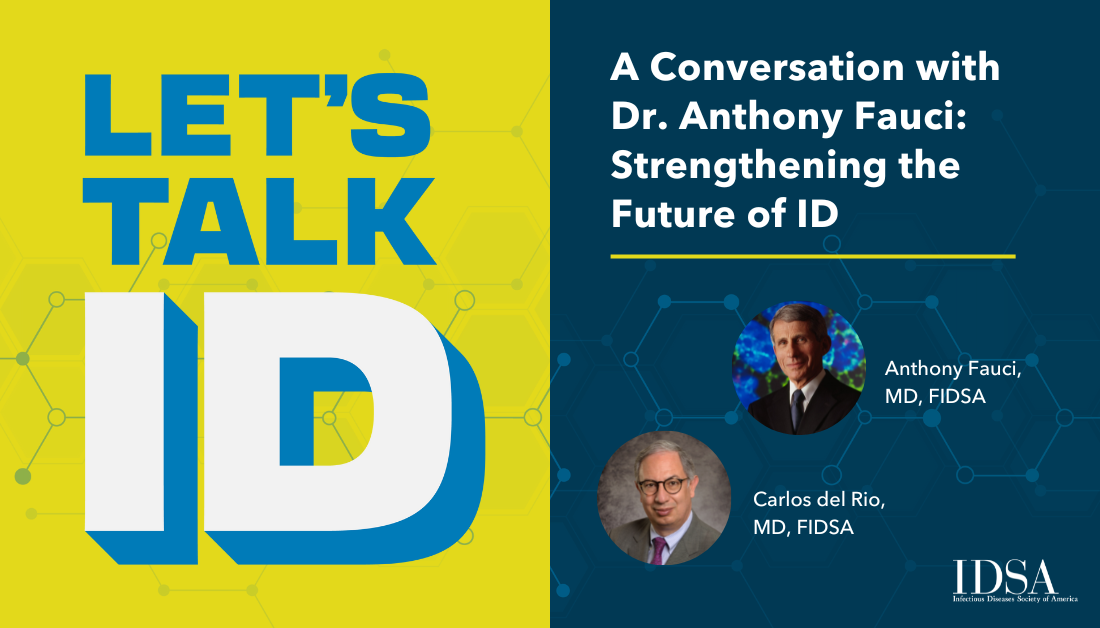 In the latest episode of IDSA’s “Let’s Talk ID” podcast, IDSA President Carlos del Rio, MD, FIDSA, talks with Anthony Fauci, MD, FIDSA, who is stepping down in December after nearly 40 years as the director of the National Institute of Allergy and Infectious Diseases at the National Institutes of Health.
In the latest episode of IDSA’s “Let’s Talk ID” podcast, IDSA President Carlos del Rio, MD, FIDSA, talks with Anthony Fauci, MD, FIDSA, who is stepping down in December after nearly 40 years as the director of the National Institute of Allergy and Infectious Diseases at the National Institutes of Health.
In a wide-ranging interview, Dr. Fauci discusses his tenure at NIAID; the intersection of his various roles as a physician, a scientist and in public health; how to combat misinformation; the current state of the COVID-19 pandemic; and how to attract more people into the ID field. Several excerpts from his responses, lightly edited for clarity, are below.
Accomplishments in the fight against HIV:
As the director of NIAID, I’m particularly proud of what we did in the area of HIV/AIDS when we established a separate program for AIDS. Over the period of 41-plus years, together with industry, we’ve played a major role in the development of a large array of antiretroviral drugs, which as we all know now, in combinations that can be given as a single pill, has transformed the lives of persons with HIV and have resulted in the saving of literally millions of lives in the U.S. and throughout the world.
How to communicate about the current phase of the COVID-19 pandemic:
We try to be consistent, as a community of infectious disease individuals and as a broad community in general. We’ve got to be realistic and honest with the public, which we are. For example, there’s a tremendous need and desire to get this over with, get it behind us. Everybody’s exhausted. The general public is exhausted. Our health care providers, who are the heroes and heroines of all of this, are exhausted. But we’ve got to make sure people understand that it is a challenge that’s still there. We can’t wish it away.
What the community of ID physicians has done correctly during the pandemic and lessons learned:
What we did correctly was certainly the science. We had been involved as a community in preparing for pandemics and making investments in basic and clinical research. It goes from the fundamental molecular structure of an mRNA to the structure-based vaccine design of the stabilized prefusion spike protein that became the highly successful immunogen to the clinical trials network that you recall we set up decades ago for HIV.
All of those things really made a very important positive impact on how we were able to respond to COVID, particularly in the development of successful, highly effective and safe vaccines as well as therapeutic approaches.
That can’t be said as emphatically for the public health infrastructure, which we thought was sufficient to address what we were going to be able to face with COVID. But it turns out that wasn’t the case. The lesson I learn from this is, continue to make the investments in basic and clinical research, but try and strengthen particularly the local public health infrastructure, which we have let really, in many respects, weaken over decades. I hope that’s a lesson that we will learn and remember.
Attracting more people to the ID field:
Explain to them how exciting this field is. I mean, it’s such a dynamic field. If you look at society in general, what is dominating us right now, it’s infectious disease. It’s COVID. It’s RSV. It’s flu. A little bit ago, it was monkeypox, that we are thankfully getting our arms around better. It’s Ebola in Africa. It’s a lot of activity that can be very fulfilling if you get involved in addressing that.
Don’t miss the full episode of the podcast. You can find it on Apple Podcasts, Google Podcasts and Spotify.
